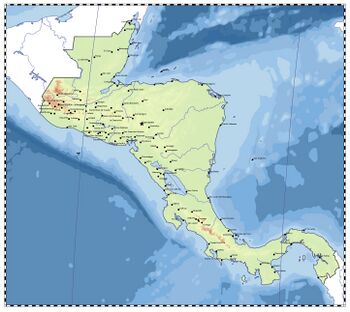Havlanca: Difference between revisions
No edit summary |
No edit summary |
||
| Line 67: | Line 67: | ||
| calling_code = | | calling_code = | ||
}} | }} | ||
'''Havlanca''', officially the '''Republic of Havlanca''' ({{wp|Spanish language|Spanish}}: ''República de Havlanca'') is a country in {{wp|Central America}}. It is bordered to the north by the {{wp|Carribean Sea}} and the {{wp|Gulf of Honduras}}, to the east by {{wp|Colombia}}, to the south by the {{wp|Pacific Ocean}} and to the west by {{wp|Mexico}}. With a population comprising of 52.1 million people it is the {{wp|List of countries in the Americas by population|4th most populous country in the Americas}} behind the {{wp|United States}}, {{wp|Brazil}} and {{wp|Mexico}}. It is a {{wp|semi-presidential republic}} with a system of {{wp|representative democracy}}. Havlanca's capital city is Tegucigalpa while its largest city is Nueva Guatemala de la Asunción. Other major urban areas include San Salvador, Managua, Darién, Villa de Sula, San José, and San Miguelito. The {{wp|Nicaragua Canal|Punta Brito Canal}} and {{wp|Panama Canal|Darién Canal}}, connecting the Pacific and {{wp|Atlantic Ocean}}, handles over 40% of global shipping anually. | '''Havlanca''', officially the '''Republic of Havlanca''' ({{wp|Spanish language|Spanish}}: ''República de Havlanca'') is a country in {{wp|Central America}}. It is bordered to the north by the {{wp|Carribean Sea}} and the {{wp|Gulf of Honduras}}, to the east by {{wp|Colombia}}, to the south by the {{wp|Pacific Ocean}} and to the west by {{wp|Mexico}}. Partially located within a {{wp|cradle of civilisation}} ({{wp|Mesoamerica}}) it is a melting pot of {{wp|Maya civilisation|Mayan}}, {{wp|Iberian peninsula|Iberian}}, and {{wp|Afro-Carribean people|Afro-Carribean}} culture. With a population comprising of 52.1 million people it is the {{wp|List of countries in the Americas by population|4th most populous country in the Americas}} behind the {{wp|United States}}, {{wp|Brazil}} and {{wp|Mexico}}. It is a {{wp|semi-presidential republic}} with a system of {{wp|representative democracy}}. Havlanca's capital city is Tegucigalpa while its largest city is Nueva Guatemala de la Asunción. Other major urban areas include San Salvador, Managua, Darién, Villa de Sula, San José, and San Miguelito. The {{wp|Nicaragua Canal|Punta Brito Canal}} and {{wp|Panama Canal|Darién Canal}}, connecting the Pacific Ocean and {{wp|Atlantic Ocean}}, handles over 40% of global shipping anually. | ||
==Etymology== | ==Etymology== | ||
Revision as of 18:42, 1 September 2023
Republic of Havlanca República de Havlanca | |
|---|---|
|
Flag | |
 Map of Havlanca | |
| Capital | Tegucigalpa |
| Largest city | Nueva Guatemala de la Asunción |
| Official languages | Spanish |
| Religion | Roman Catholic |
| Demonym(s) | Havlancan |
| Government | Unitary semi-presidential republic |
| Legislature | National Assembly |
| Area | |
• Total | 523,832 km2 (202,253 sq mi) |
| Population | |
• 2022 census | 52,176,283 |
• Density | 99.6/km2 (258.0/sq mi) |
| GDP (PPP) | 2022 estimate |
• Total | $1.78 trillion |
• Per capita | $34,150 |
| GDP (nominal) | 2022 estimate |
• Total | $791.932 billion |
• Per capita | $15,178 |
| Date format | mm-dd-yyyy |
Havlanca, officially the Republic of Havlanca (Spanish: República de Havlanca) is a country in Central America. It is bordered to the north by the Carribean Sea and the Gulf of Honduras, to the east by Colombia, to the south by the Pacific Ocean and to the west by Mexico. Partially located within a cradle of civilisation (Mesoamerica) it is a melting pot of Mayan, Iberian, and Afro-Carribean culture. With a population comprising of 52.1 million people it is the 4th most populous country in the Americas behind the United States, Brazil and Mexico. It is a semi-presidential republic with a system of representative democracy. Havlanca's capital city is Tegucigalpa while its largest city is Nueva Guatemala de la Asunción. Other major urban areas include San Salvador, Managua, Darién, Villa de Sula, San José, and San Miguelito. The Punta Brito Canal and Darién Canal, connecting the Pacific Ocean and Atlantic Ocean, handles over 40% of global shipping anually.
